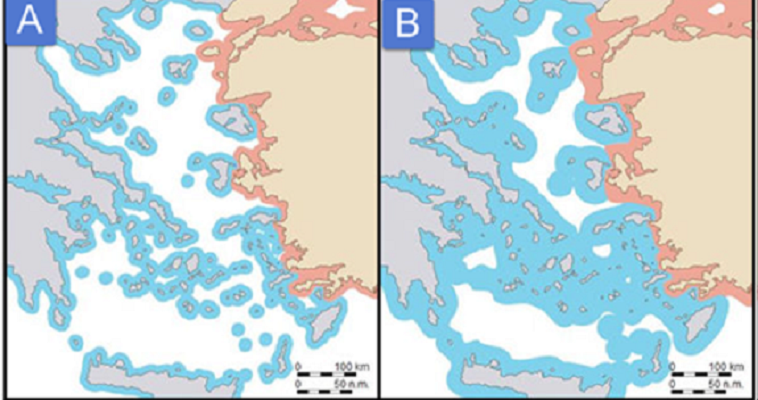StavrosLygeros: The exploratory talks, the expansion of the territorial waters and Professor Rozakis
13/01/2021
On December 21, 2020, my article was published entitled “Exclusive: The carpet is laid for exploratory talks in January – All the background”. The information was completely confirmed and both sides will pick the thread up from where they left it in 2016. However, they disagree on the agenda of the talks.
As is known, the Greek side publicly insists that it will talk only about the delimitation of the continental shelf-EEZ, while the Turkish side insists that the agenda must be “open”, with each side raising any issue it wants. Its goal is to turn its unilateral expansionist claims into “legitimate” bilateral disputes. Obviously, Greek diplomats can not stop the Turks from saying what they want, but they can refuse to enter into negotiations on non-demarcation issues.
The impending resumption of exploratory talks, in conjunction with the bill for the extension of Greek territorial waters (to 12 miles) in the Ionian and the southern Peloponnese, brought the issue back to the forefront, resulting in the well-known “black and white” notion prevalent in the public sphere. So, are exploratory contacts legitimate or a trap?
The answer depends on their context. If their object is solely the delimitation of the continental shelf-EEZ they are legitimate, although they are rather unlikely to lead to a result. It is no coincidence that the previous 60 rounds proved to be fruitless. The why is not something to examine at present. But if the framework is violated, the exploratory talks will become a trap, because the expansion of the agenda will create a diplomatic precedent.
An unbridgeable position
But there is another trap. As is well known, Greece, citing international law, argues that the islands have full influence on a continental shelf-EEZ, ie the principle of the midline should be applied as a delimitation method. Turkey, however, argues – contrary to international law – that no island (even Crete) is entitled to a continental shelf-EEZ. In other words, the positions of the two sides are unbridgeable. So what would happen if there was good will? The two sides would appeal to the International Court of Justice to resolve the dispute.
Because Turkey has not recognized its jurisdiction, unlike Greece, a co-commitment is required. What could be simpler and clearer than for the two countries to ask The Hague to delimit the continental shelf-EEZ based on international law, which both are supposed to accept. Why do we need so many negotiations?
Exploratory talks belie a trap
Here’s the trap, as evidenced by the minutes of many years of exploratory contacts. In its attempt to lead Ankara to The Hague, Athens had been “enticed” into a negotiation, the object of which was essentially to circumvent international law. To be precise, the two sides were discussing an agreement, which – through what it implies – would indicate to the International Court of Justice exactly how it would delimit it.
In other words, they would ask the court to put its stamp on an almost pre-determined demarcation. If both sides have reached an agreement, the Court has no problem ratifying such an agreement that bypasses international law, as Ankara has traditionally sought. Why does one need the Hague rubber stamp? In order to neutralize the reactions, mainly in Greece, which is supposed to insist on the application of international law. The government will seek refuge behind The Hague’s decision.
The above emerges from the records of past exploratory talks. This article of mine (Kathimerini 4-6-2006) provides details, which show that the negotiators had essentially bypassed geography. It also appears that the exploratory talks had from the beginning exceeded the narrow framework of the continental shelf-EEZ delimitation, since for years the object of the negotiation was the range of Greek territorial waters.
Athens had accepted Greek territorial waters of multiple widths. Professor Rozakis (former Deputy Foreign Minister in the Simitis government) also admits this in a recent article. In this he not only defends the usefulness of exploratory contacts, but also opposes the extension of the territorial waters of the Aegean islands to 12 miles. Exactly as I wrote it.
What Rozakis writes and territorial waters
He writes specifically: “I know that this will seem an unorthodox solution for the lovers of 12 n.m. [territorial water limit] and for those who believe that Greece cannot discuss issues of sovereignty and a right that it can exercise unilaterally. It is true that, according to the Convention on the Law of the Sea, Greece has the right to unilaterally exercise the extension up to 12 n.m. (the maximum allowed by international law), without taking into account the objections of third countries in this matter. But let us keep in mind that such a possibility changes this sea into a closed Greek lake that prohibits free navigation not only for Turkey but also to all the numerous users of this sea “.
While Rozakis admits that the expansion is a right of Greece that is legally exercised unilaterally, immediately afterwards he undermines it, saying that with the expansion the Aegean will become a “Greek lake” and thus free navigation will be prohibited! It’s an unworthy argument for a professor of international law. In the sea of the Cyclades, in which due to the cluster of islands there are no international waters (or very limited) and therefore it is a “Greek lake”, is there no free navigation? Of course there is.
Whatever is valid in the Cyclades will be valid where the extension to 12 miles will leave no international waters. Rozakis is forced to say that yes, Russia has recognized the right of Greece to expand its territorial waters, but he hastens to add that he does not want it. He also mentions the USA, saying that the safe passage provided by international law is not enough!
Pretexts in sin
The distinguished professor has been divorced from rationalism. What he says are pretexts in sin. Obviously Russia and the US have more ease of movement if the islands are left with six miles of territorial waters and would have even more with three miles of territorial waters. But they also follow the dictates of international law. By what argument will Greece be denied a right exercised by all the coastal countries of the world? In addition, Greece will accompany the expansion of its territorial waters with the introduction of free passage channels in the Aegean, in order to remove even the unacknowledged objections of the great powers.
In fact, Professor Rozakis seeks to justify the choices of the politician Rozakis. However, using one’s academic expertise to give credibility to one’s political position is unethical, in fact it is a moral slip. It would be honest if he stated that it is appropriate for Greece to negotiate with the Turks, although it is not legally obliged, because there is the casus belli, that is, because it is afraid.
This is what determines his thinking and this emerges from his article. His relief is obvious that due to the investigators the temperature will drop in Greek-Turkish. He writes: “The existence of the contacts served as a unique basis for the avoidance of incidents … from this noose, with the withdrawal of the research vessel and its use for research in undisputed waters, for at least six months “.
In other words, the phobic syndrome is so intense and the psychological need of the elites to buy time so great, that the discounts on their national sovereignty seem an acceptable price.





